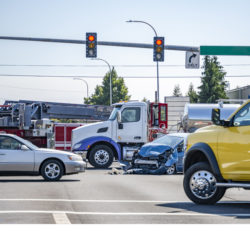How to Determine the Cause of Your Motor Vehicle, Motorcycle or Truck Crash
Motor vehicle accidents, including truck crashes and motorcycle accidents, can be traumatic and life-altering events, often leaving those involved with physical injuries, emotional distress, and financial burdens. Determining the cause of an accident is crucial for several reasons, including insurance claims, legal proceedings, and improving road safety. This brief guide will take a look at the key steps and considerations involved in investigating the causes of an accident.
But First: Prioritize Safety and Seek Medical Attention
Before discussing the investigation process, it’s extremely important for all involved to prioritize safety and ensure that everyone involved in the crash receives appropriate medical attention. Emergency services should be contacted immediately if there are serious injuries. A prompt response to injuries not only aids in recovery but also establishes a connection between the accident and any subsequent health issues.
Be Sure to Collect Information at the Accident Scene
The accident scene is a critical starting point for determining the cause. Take note of the following:
- Contact Information: Exchange names, addresses, phone numbers, and insurance information with other parties involved.
- Witnesses: Identify and collect contact information from any witnesses. Their statements can be invaluable in understanding the sequence of events leading to the accident.
- Photographs: Snap photos of the scene, vehicle positions, road conditions, traffic signals, and any relevant signage. Photos can serve as crucial evidence in the later stages of the investigation.
Document the Accident by Filing a Report With the Police
File a police report by contacting the local authorities. A police report provides an official account of the accident, including statements from involved parties and witnesses. This document can be pivotal in determining fault and causation during insurance claims or legal proceedings.
Be Aware of State and Local Traffic Laws and Regulations
Familiarize yourself with local traffic laws and regulations applicable to the area where the accident occurred. Knowing the rules of the road will help assess whether any party involved violated traffic laws, leading to the accident. Violations such as speeding, running red lights, or failing to yield the right of way can establish liability.
Analyze Vehicle Damage
Examine the damage sustained by vehicles involved in the accident. The extent and location of damage can provide insights into the dynamics of the collision. Skid marks, debris patterns, and the final resting positions of the vehicles are also essential clues in reconstructing the sequence of events.
Eyewitness Testimonies Can Be Crucial to Your Case
Interview witnesses to the accident to gather their perspectives on what transpired. Eyewitness testimonies can offer valuable information, potentially corroborating or contradicting statements made by other parties involved. Collect their statements and contact information for future reference.
Utilize Technology: Dashcams and Surveillance Footage
In the era of advanced technology, many vehicles are equipped with dashcams. If available, obtain footage from these devices to gain a firsthand view of the moments leading up to the accident. Additionally, check for surveillance cameras in the vicinity that may have recorded the incident.
Analyze and Review Black Box Data
Modern vehicles often come equipped with event data recorders (EDRs), commonly referred to as “black boxes.” These devices record crucial data such as speed, braking, and acceleration in the moments before an accident. Accessing and analyzing this data can provide critical insights into the cause of the collision.
Consider the Weather and Road Conditions at the Time of the Crash
Consider external factors that may have contributed to the accident, such as weather conditions and road state. Wet or icy roads, poor visibility, or poorly maintained road surfaces can significantly impact vehicle dynamics and increase the likelihood of accidents.
Note Driver Statements and Admissions
Statements made by drivers involved in the accident can be telling. Admissions of fault or culpability can provide straightforward evidence of the cause. However, it’s important to exercise caution, as individuals may be under stress or may not fully comprehend the situation immediately after an accident.
Consider the Use of Expert Analysis and Accident Reconstruction
In complex cases, consider seeking the expertise of accident reconstruction specialists. These professionals can analyze the available evidence, including witness statements, vehicle damage, and black box data, to reconstruct the sequence of events leading to the accident. Their findings can be crucial in establishing causation.
Obtain Medical Reports and Detail All Injuries
Review medical reports detailing injuries sustained by individuals involved in the accident. Understanding the nature and extent of injuries can provide clues about the force and impact of the collision, helping to establish the cause.
Let a Florida Accident Attorney Help You Get the Compensation You Deserve
Determining the cause of a motor vehicle accident requires a systematic and thorough investigation, incorporating various elements from the scene, witness testimonies, and technological sources. By following these steps and considering the multifaceted factors involved, individuals can piece together a thorough understanding of the accident’s causes. This information is not only crucial for insurance claims and legal proceedings but also for promoting road safety and preventing future accidents. If you or a loved one has been hurt in a crash, seek legal guidance right away. Time is of the essence; contact our office today.
Share This



